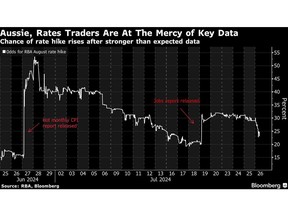Article content
(Bloomberg) — Debate over whether Australia’s central bank needs to deliver a late-cycle policy tightening is likely to be resolved with the release of quarterly inflation data this week — and the currency is set to be swept up in the fallout.
Headline consumer prices probably advanced 3.8% in the second quarter from a year earlier, from 3.6% in the prior period, economists predicted ahead of Wednesday’s release. A key core measure, trimmed mean inflation, which smooths out volatile prices, is seen holding at 4%. That’s above the Reserve Bank’s latest forecast of 3.8% and suggests limited progress in reining in prices.
Article content
“If inflation is four-point something and they don’t raise, it starts to substantially bite into their inflation-fighting credibility,” said Stephen Miller, an investment strategist at GSFM. “What that might mean is the longer tenor bond yields in Australia struggle and certainly underperform the US.”
The Reserve Bank has raised rates by less than global counterparts as it sought to hold onto employment gains while worried about the capacity of heavily-indebted households to cope. Stubborn inflation that suggests the RBA would fail to meet its goal of returning price gains to the 2%-3% target late next year is likely to require a further hike — and risks tipping a weak economy into recession.
The price report comes on the heels of higher-than-forecast jobs growth and strong retail sales, while measures of business surveys remain resilient. A partial gauge of prices rose by more than expected for a third straight month in May, raising questions over whether policy is “sufficiently restrictive.”
The RBA has pledged to be “vigilant” on upside price risks and the rate-setting board considered a hike in June, before deciding to stand pat at 4.35%. Although the odds are lower from earlier this month, money markets are still pricing a one-in-five chance that the Reserve Bank will raise the rate at the Aug. 5-6 meeting.
Article content
“Inflation in Australia is still high relative to its global peers,” said Diana Mousina, deputy chief economist at AMP Ltd. She reckons a quarterly result above 1% “would probably lead to the Reserve Bank hiking” as it would be farther away from its inflation goal.
Economists predict inflation rose 1% from the previous three months.
It won’t just be financial markets and policymakers nervously waiting for the print. A cooling of inflation and end to rate-hike talks would keep the door open for the center-left government to call an early election this year. Faster price growth and the threat of further tightening would likely rule that out.
Inflation was probably driven last quarter by housing rents and dwelling costs as well as insurance and financial services. In addition, fiscal spending remains strong, particularly at the state level, boosting demand and prices.
Australia’s policy caution has left it near the back of the global cycle given the RBA is discussing hikes at a time when some peers are already easing. The Bank of Japan is an outlier, with Bloomberg Economics predicting a hike on Wednesday.
Article content
Elsewhere, the Bank of Canada has delivered back-to-back cuts while the European Central Bank has also lowered rates. China, which is Australia’s top trading partner, has been reducing borrowing costs.
The Federal Reserve is likely to lay the groundwork for a September pivot at this week’s meeting. A particularly dovish Fed may caution the RBA against hiking.
“With China easing and the risk of Fed and other developed market central bank easing on the horizon, the RBA is highly cognizant of fine tuning monetary policy when the pulse is shifting to the downside,” said Prashant Newnaha, Singapore-based senior rates strategist at TD Securities.
Newnaha pointed to a recent sell-off in the Australian dollar saying “the CPI is unlikely to rescue the slide.”
The Aussie has slumped almost 2% against the dollar this month, among the worst performing major developed market currencies as risk sentiment was hit by falling commodity prices and worries over China’s economy. That’s a reversal for the currency, which had been a top performer on RBA hike bets.
—With assistance from Shinjini Datta and Ben Westcott.
Share this article in your social network

